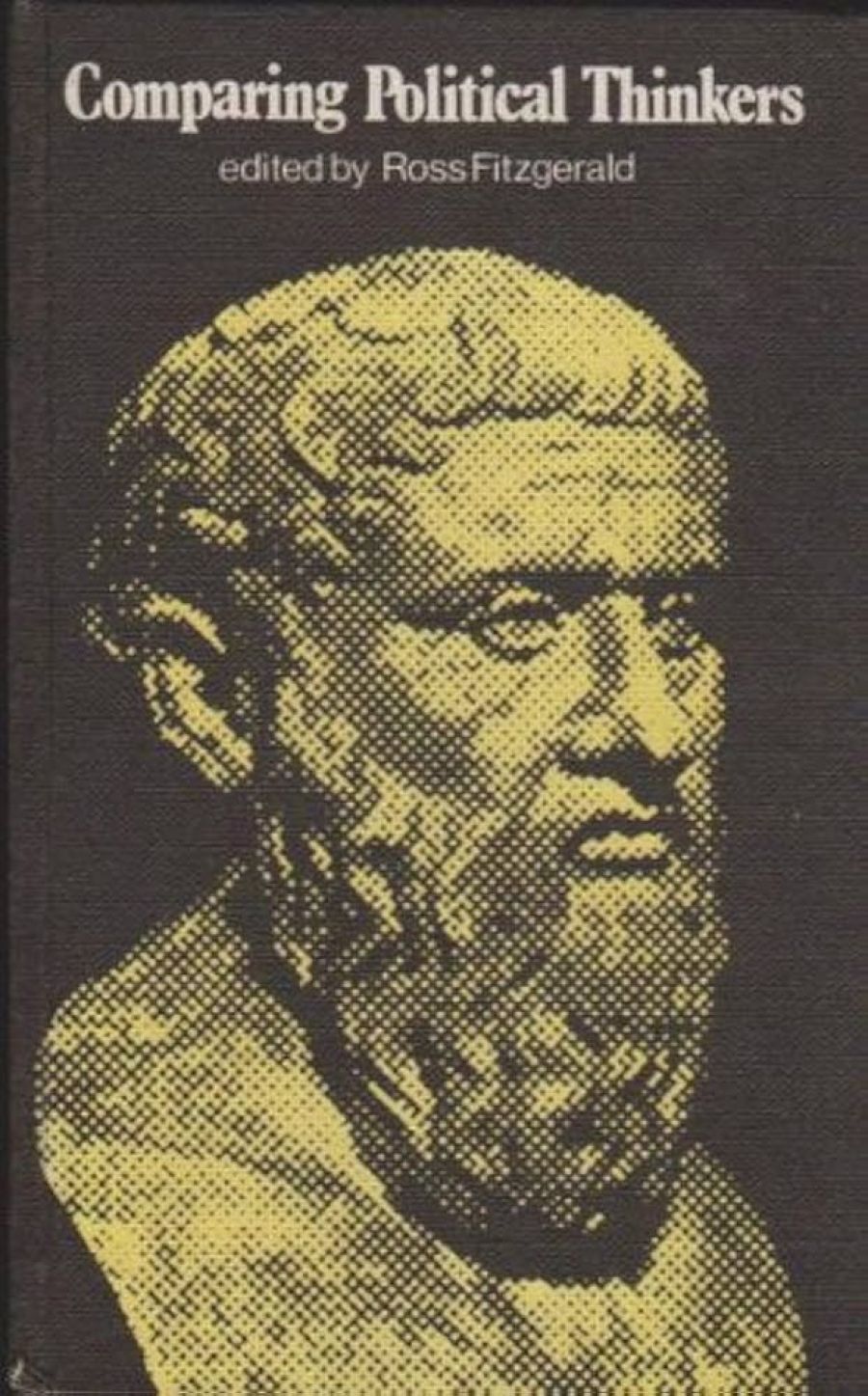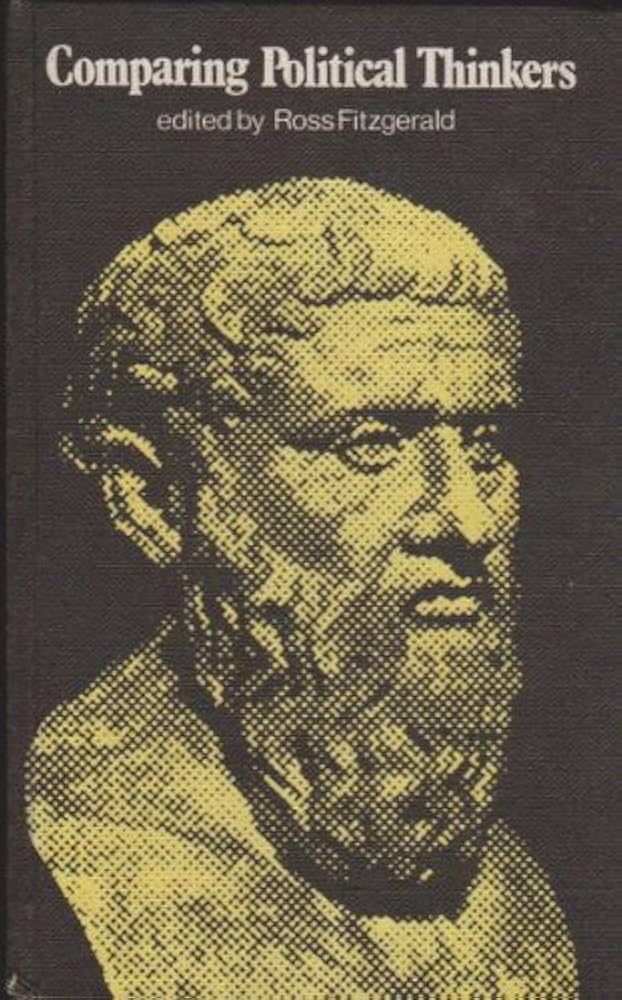
- Free Article: No
- Contents Category: Politics
- Review Article: Yes
- Article Title: Taking Political Ideas Seriously
- Online Only: No
- Custom Highlight Text:
Shakespeare’s Dogberry, moving as usual beyond conventional platitude, roundly condemned all comparisons as odorous. Although this book consists entirely of essays in comparison, one need approach it with no Dogberrian apprehensions. Indeed it is one more manifestation of a recent and surely healthy tendency in the academic study of politics, namely, the willingness to take seriously political theories and ideas rather than merely engage in the ‘scientific’ study of political behaviour, itself often the excuse for an arid pursuit of near-meaningless statistics.
- Book 1 Title: Comparing Political Thinkers
- Book 1 Biblio: Pergamon Press, $16.00 pb, 302 pp
- Book 1 Cover Small (400 x 600):

- Book 1 Cover (800 x 1200):

Each of the fifteen essays in the book attempts to compare the political ideas and arguments of two theorists. Most of the essays are written by different people although there is some doubling-up – in all, thirteen authors are employed to compare pairs from amongst twenty-three theorists. Some of the compared theorists are close in time, space and culture, others are distant in all three and the variables are permuted appropriately in other cases. The editor notes in his Preface that there are some striking omissions (for instance, Bentham) but excuses this as inevitable. More pertinent is the fact that there appears to be no principle behind the inclusions and exclusions. I suspect that no principle was used, the contributors simply being given their heads. The end result is nevertheless happy enough. If one purpose of the book is to provide an introduction to political thought in an historical setting (as the Preface implies) then it should serve reasonably well and some of the essays will interest those who no longer think of themselves as beginners.
On the other hand, there are flaws that are probably endemic to such an enterprise. One is the tendency to round off the rough edges of an individual’s thought, to ignore what is problematic, in order to make him a more adequate figure for comparison and contrast. For instance, someone new to political theory, reading Damien Grace’s interesting comparison of Augustine and Hobbes, would probably be amazed to find, on opening Leviathan, that about half of the book is directly concerned with theological discussion and scriptural exegesis. So concerned is Grace to present a stark contrast between Augustine’s theological world view and Hobbes’ scientific materialism that he ignores the very real possibility that Hobbes genuinely saw his materialism as itself a part of a theological outlook. The fact that this seems so curious to us may reflect more about the narrowness of our assumptions than the idiosyncrasy of Hobbes’.
Another example is Roger Masters’ suggestive evaluation of the influence of Hobbes and Locke on subsequent Western political thought and action (with special reference to the American Revolution). Here, the desire to show affinities between the two thinkers sometimes leads to an emphasis on surface similarities at the expense of deep divergences. Although both theorists employ a terminology of natural right, for instance, the meaning and scope of the terminology is really strikingly different. Moreover, although Hobbes thinks that the subject always retains the right to protect his life and bodily freedom, even against the Sovereign, this is a long way from the belief (attributed to Hobbes by Masters) in those inalienable ‘rights to life, liberty and the pursuit of happiness’ which were boldly proclaimed by the American revolutionaries whom Hobbes would pretty certainly have regarded as seditious rebels. Masters also claims Hobbes as a supporter of ‘the principle of majority rule’ merely because his original contract is one in which all men agree to be ruled by whatever man or body the majority selects, Yet although Hobbes thinks that majority decisions are sometimes unavoidable it doesn’t follow that he supports some politically democratic principle such as that embodied in electoral processes. On the contrary, he holds that the Sovereign, once constituted, is absolute and he prefers a monarchy to other forms of government.
Some of the choices for comparison are a bit queer. Conal and Averil Condren compare Thomas More and Socrates, neither of whom is a political thinker in the sense of having made a substantial contribution to political theorising. Both had to think politically when faced with difficult moral decisions in their lives and there is a background against which their thinking took place but neither expounded a political theory. Inevitably, the essay (written originally for a Thomas More Congress in Sydney) turns into a somewhat rhetorical comparison of lives, implicit values, cultural and intellectual backgrounds. Ross Fitzgerald compares Socrates and Plato, treating as Socratic the views expressed in the earliest Platonic dialogues, but although it is clear that the Plato of The Republic and The Law is a major political thinker, the Socrates we inherit from Plato (and elsewhere) has very little to say about politics.
It is not possible to comment on all the essays but I think that the best are: James MacAdam on Rousseau and Hobbes, Vincent di Norcia on Calvin and Kropotkin, Patricia Springborg on Rousseau and Marx, Michael Jackson on Rawls and Nozick, and Conal Condren on Marsilius and Machiavelli. A number of the other essays were, if less impressive, nonetheless instructive. Wu Teh Yao's comparisons of Plato with Confucious and Aristotle with Mencius reveal wide differences between Western and Chinese conceptions of inquiry to the point where the author himself admits that, in the case of Aristotle and Mencius, their political works are really ‘not closely comparable’. Ross Fitzgerald’s comparison of Marcuse and Bay is refreshing in its vigorous concern to get at what is true and what false in his authors’ writings – a concern absent from some of the essays more directed towards the history of ideas. I previously knew little of Christian Bay whose theories lay great stress upon a distinction between needs and wants. Fitzgerald claims that Bay’s employment of the distinction has ‘profoundly authoritarian, even totalitarian implications’. I do not think that Fitzgerald is nearly clear enough about the meaning and ethical import of terms like ‘elitism’, ‘authoritarianism’ and the like with which he is rather free, but, in any case, his argument for the supposed implications seems to rest upon the fact that the distinction could be dangerously misused. This is true of virtually any distinction of political interest. I suspect that his real case against Bay is the traditional liberal critique of ideological politics but although, since Mill, a rough outline of that critique is part of the mental equipment of most Western intellectuals its sharp delineation is another matter altogether.


Comments powered by CComment